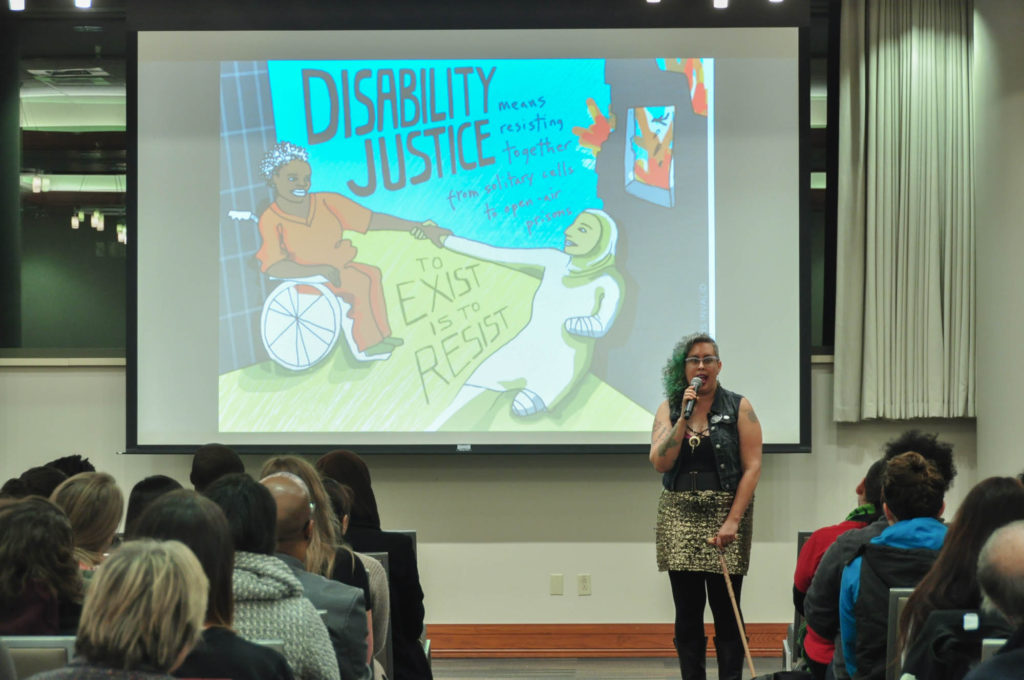In light of the recent political climate, there is no doubt that many people across the nation are aching to engage with their communities in a proactive way. But despite their altruistic motives, well-intentioned people are capable of reinforcing something called the “white savior complex.”

Leah Lakshmi Piepzna-Samarsinha, an award-winning author, spoke to SU students and other community members about organizing against the savior mentality.
Last Wednesday, students, faculty and community members met in the Student Center to attend “Organizing against the Savior Mentality.” Student Government at Seattle University, the Center for Community Engagement and Reignite the Mission sponsored the event.
Dr. Rachel Luft, Associate Professor of Sociology at Seattle University, was the faculty sponsor. She expressed the crucial nature of this dialogue.
“I think the savior mentality is salient and dominant everywhere in this country historically and today,” Luft said. “There’s a way in which so many well-intentioned people, out of the goodness of their heart, in ways that reproduce their own internalized sense of superiority, in the spirit of good intentions, end up reenacting the very systems of oppressions that they think that they are trying to dismantle.”
The “white savior mentality” reinforces the concept that there are inferior communities in the world who need to be “saved” by white ideologies, technologies or leadership.
Jordan Flaherty, journalist and author of “No More Heroes: Grassroots Responses to the Savior Mentality” refers to himself as an organizer and an activist. He spoke to these labels at the reception.
“When you talk about being an activist or an organizer, we’ve built up this thing that’s like a special class of people. I think part of being alive should be trying to make this world better,” he said. In this way, Flaherty reinforced the idea that organizing work should be accessible to all those who feel the call to improve the world.
Author Leah Lakshmi Piepzna-Samarasinha is a self-proclaimed queer, sick and disabled femme of color who organizes for intersectional disability justice. She defines disability justice as “a movement of disabled people who are taking an intersectional lens to look at fighting ableism and for disabled rights and culture. We look at how ableism racism, classism, sexism and all forms of oppression are connected. I talked about the ways in which disabled people so often have been seen as people who need to be ‘done’ for.”
After brief presentations by both speakers, there was time allotted for questions. During this portion of the event, students and Seattle U community members asked linking questions about how they might apply this information to their college experience and beyond.
Seattle U senior Rose Lassalle-Klein shared what she thought students should do to prevent the white savior complex in our community.
“I think [students need to use] a very critical and honest lens [to] interrogate some of the programs that our schools offer and the assumptions that they’re based on about what we have to offer people and what they have to offer us,” she said.
Lassalle-Klein added that school- sponsored social justice opportunities such as Dance Marathon don’t necessarily align with the definition of social justice she has learned through her experience with the Jesuit tradition.
While this “Organizing Against the Savior Mentality” event has sparked energetic and inquisitive dialogue for some, it was not received positively by the entire Seattle U community. Luft, faculty sponsor for this event, encountered some hostility from an anonymous community member prior to the event.
“Five minutes before this event started someone handed me one of the flyers for this event that had been defaced,” Luft said. “We decided not to mention it at the event but I think it’s important for people to know that in our little enclave, there’s a lot of resistance to growth and to justice.”
The comments on the flyer addressed what Luft refers to as the “problematic and superficial” notion “colorblindness,” which implies that issues of race would go away if people stopped talking about it altogether. Luft emphasized that, “History has shown us that’s not how these issues go away.” No individual or group has claimed responsibility for defacing the flyer.
Tyrone Brown, Assistant Director in the Office of Multicultural Affairs, expressed his hopes for structural program changes after this program.
“In terms of the white savior aspect, I’m hoping students take away in relation to service learning trips a different framework in which to engage communities,” he said.
Brown also expressed that the Office of Multicultural Affairs is open for students seeking personal counseling in coping with these concepts or looking to brainstorm ways to dismantle the “savior mentality” in the community. The Office of Multicultural Affairs is located in the James C. Pigott Pavilion for Leadership in room 180.
The editor may be reached at
news@su-spectator.com





